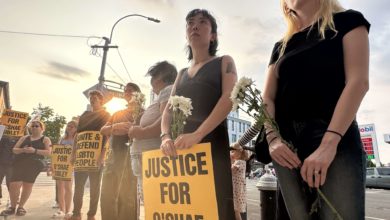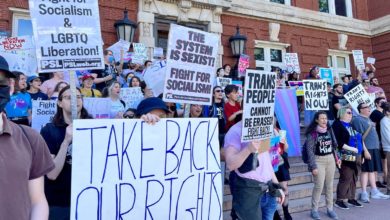
The recent dramatic upsurge in the struggle for same-sex marriage rights has revitalized the movement for lesbian, gay, bisexual and transgender equality. Undoubtedly, watching thousands of same-sex partners defiantly celebrating their weddings in San Francisco, Boston, and elsewhere has opened the eyes of millions of workers in the United States and around the world.
Meanwhile, the renewed struggle has struck fear and loathing into the hearts of bigots from coast to coast. Right-wing zealots and bible thumpers are waving the flag in the name of “family values” and the “American way of life,” all the while declaring that the demise of civilization is at hand. Predictably, these forces are rallying behind the Bush administration’s proposed constitutional amendment, which would codify inequality for LGBT people by stating that marriage is only valid if between a man and a woman.
Democratic Party politicians, including presidential candidate John Kerry, are running for cover, and merely cowering in front of the right wing. Instead of supporting basic civil rights, they are dodging the ball, calling for phony “civil” unions, which deny full equality to same-sex partners.
There are some significant exceptions to this among the ranks of the Black Congressional Caucus and some Latino leaders in Washington. On July 11, 1996, Congressman John Lewis, a Black civil rights leader, rightly denounced President Bill Clinton’s “Defense of Marriage Act” as “stinking of the same fear and hatred as racism and bigotry.” Similarly, Coretta Scott King and other prominent leaders have supported same-sex marriage as a basic civil right.
This is due, in part, to the shared experiences of all those who face discrimination—racism, sexism, LGBT oppression, or otherwise—under capitalism. It is notable that many of the same racists and bigots who now invoke “divine law” against same-sex marriage viciously opposed interracial marriage decades ago.
At one time, interracial marriage was prohibited in forty states (in Massachusetts, as early as 1705). A 1948 California Supreme Court ruling made it the first state high court to declare the ban on interracial marriage unconstitutional. At that time, thirty-eight states still forbade interracial marriage; not until 1967 did the U.S. Supreme Court strike down the remaining bans.
A victory after historic struggles

The current struggle grows out of a decades-old movement for the basic democratic rights of LGBT people, a movement that burst onto the world scene in the historic 1969 Stonewall rebellion in New York City. That rebellion also turned the public eye to LGBT history, previously driven underground (but never fully eradicated) by feudal lords and capitalist exploiters.
Those thousands of same-sex couples that are now proudly and defiantly affirming their right to equality are bearing the fruits of a decades-old LGBT movement. The movement’s struggles include mass mobilizations in Washington, DC for LGBT rights in 1971, 1987 and in 2000, the fight against Anita Bryant and her right-wing backers, the successful boycott of Coors beer for its homophobic policies and union busting agenda, the fight for AIDS funding, local and national mobilizations against gay bashing hate crimes, solidarity with transgender activists and much more.
LGBT people have in fact been oppressed, persecuted and maligned since the emergence of class society and patriarchal social organization. Before Stonewall, many lesbians, gay men and transgender people, as well as socialists and other revolutionaries, courageously struggled to resist the restrictive laws of the Church and state. Prior to the 1917 Bolshevik revolution in Russia, Magnus Hirshfeld and like-minded communists founded the Scientific Humanitarian Committee in Germany to fight for homosexual emancipation.
The Bolsheviks adopted the call for equality. After their victory in the Russian Revolution, they struck down the sodomy laws in Russia and elsewhere. Unfortunately, these gains were turned back in the midst of the political conservatism that characterized Stalin’s leadership in the USSR.
The Origins of LGBT Oppression
In his 1884 landmark study, “The Origin of the Family, Private Property and the State,” Frederick Engels traced the development of human society in relation to the historic development of the means of production, paying close attention to the family and the role of women. Since that time, scores of anthropologists like Karen Sacks and Eleanor Burke Leacock have expanded and corroborated Engel’s thesis.
Although the period of matriarchal society traced the lineage of newborns through the woman, this was not a hierarchical division. Cooperation between the sexes was imperative for survival in a hostile environment; the administration and decision-making of the community was shared. The eventual patriarchal overthrow of “mother right” was directly related to changes in production (such as improved agricultural techniques), which generated a surplus, and the subsequent accumulation of wealth.
Patriarchal domination of both the wealth and the organization by which that wealth was controlled (i.e., the state) produced new modes of exploitation and inequality. This historic change created an order that degraded, subjugated and enslaved women. The family, once a loose connection of men and women living and working in proximity to each other, became a monogamous unit of a man and a woman. Where the care of children and elderly was once communally organized, the male partner instead began to dominate and rule—the children and his spouse became his property. The needs of the emergent state ordered, controlled and degraded sexuality itself.
Homosexual and transgendered people—seen as perfectly natural in previous matriarchal society—became a threat to the new male-dominated order. The patriarchal system established restrictive social and behavioral norms, which required sexual partnering with the opposite sex. This norm served to produce male heirs, while at once providing new toilers who would generate the wealth for the emerging ruling class. Those who defied the new rigid rules of conformity, through homosexual behavior or transgender identification, were labeled as heathens and witches. Persecuted and killed over centuries of time, only those who could hide their behavior or “pass” as one gender or another would survive.

What’s at stake
At stake in the current fight for same-sex marriage are the hundreds of benefits that opposite-sex married couples enjoy, such as healthcare, insurance, hospital visitation rights, adoption policies, etc. In fact, most of these benefits first emerged as concessions, won by workers after hard-fought struggles with their bosses. The renewed struggle for many of these same benefits by millions of LGBT couples and their organizations will underscore to all the need for class solidarity in opposing policies of inequality and discrimination. “An injury to one is an injury to all.”
The fight for basic democratic rights for LGBT people will undoubtedly bring greater numbers into the struggle. Connecting that struggle with those that oppose racism, sexism and imperialism will be of key importance in building class solidarity. The recent stunning developments have brought the issue of LGBT rights—for so long a forbidden mainstream subject—into the open. Discussion of this issue will help strengthen solidarity among the ranks of workers, and therefore play a positive role in building the labor movement.
Increased participation of women, immigrants and other oppressed workers in recent labor struggles has illustrated the changing face of the working class in the United States. While millions of LGBT workers are still forced to remain in the closet due to the country’s prevailing bigotry and backwardness, increased militancy among LGBT workers—many of whom are now able to be visible and “out” at work—will eventually help unite all workers and advance the struggle against capitalist exploitation.
May 17, 2004 demonstration in San Francisco supporting same-sex marriage.
Photo: Bill Hackwell
Over 3,000 same-sex marriages took place in San Francisco City Hall starting in February 2004.
Photo: Bill Hackwell
May 15, 2004, LGBT community and supporters march in Silverlake neighborhood of Los Angeles supporting same-sex marriage rights.
Photo: Kelly Wine






